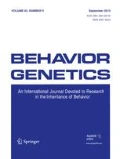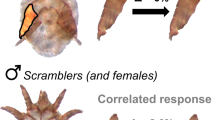Abstract
Artificial selection for short and long attack latency levels in wild maleMus musculus over 11 generations was successful for short latencies. The realized heritability of 0.30 is comparable to those found in other selection studies on aggression. In part selection may have been for faster ontogenetic development of short attack latencies. Four attempts to select for longer attack latencies failed because the lines died out immediately or within two generations for unknown reasons. But neither the physical condition of the animals nor their behavior appeared to have been the cause. Female aggressiveness as measured in female-female encounters was not affected by the selection exerted on the males. This suggests that no genetic correlation exists between aggressiveness of males and females, confirming results of P. D. Ebert and J. S. Hyde [(1976).Behav. Genet. 6:291–304] obtained in a selection experiment on aggression using females.
Similar content being viewed by others
References
Busser, J., Zweep, A., and van Oortmerssen, G. A. (1974). Variability in the aggressive behaviour ofMus musculus domesticus; its possible role in population structure. In Van Abeelen, J. H. F. (ed.),The Genetics of Behaviour, North-Holland, Amsterdam, Oxford.
Catlett, R. H. (1961). An evaluation of methods for measuring fighting behaviour with special reference toMus musculus.Anim. Behav. 9:8–10.
Crowcroft, P. (1966).Mice All Over, Foulis, London.
DeFries, J. C. (1967). Quantitative genetics and behavior: Overview and perspective. In Hirsch, J. (ed.),Behavior-Genetic Analysis, McGraw-Hill, New York.
Ebert, P. D., and Hyde, J. S. (1976). Selection for agonistic behavior in wild femaleMus musculus.Behav. Genet. 6:291–304.
Falconer, D. S. (1964).Introduction to Quantitative Genetics, Oliver and Boyd, Edinburgh.
Ginsburg, B., and Allee, W. C. (1942). Some effects of conditioning on social dominance and subordination in inbred strains of mice.Physiol. Zool. 15:485–506.
Hyde, J. S., and Ebert, P. D. (1976). Correlated response in selection for aggressiveness in female mice. I. Male aggressiveness.Behav. Genet. 6:421–427.
Lagerspetz, K. (1964). Studies on the aggressive behavior of mice.Ann. Acad. Sci. Fenn. (B) 131:1–131.
Manning, A. (1972).An Introduction to Animal Behaviour, 2nd ed., Edward Arnold, London.
McClearn, G. E., and DeFries, J. C. (1973).Introduction to Behavioral Genetics, Freeman, San Francisco.
Roberts, R. C. (1967). Implications of behavior genetics for genetics. In Hirsch, J. (ed.),Behavior-Genetics Analysis, McGraw-Hill, New York.
Selander, R. K. (1970). Behavior and genetic variation in natural populations.Am. Zool. 10:53–66.
Siegel, S., (1956).Nonparametric Statistics for the Behavioral Sciences, McGraw-Hill, New York.
van Oortmerssen, G. A. (1971). Biological significance, genetics and evolutionary origin of variability in behaviour within and between inbred strains of mice (Mus musculus).Behaviour 38:1–92.
White, M., Smith, M., and Edwards, D. A. (1969). Fighting in female mice as a function of the size of the opponent.Psychon. Sci. 16:14–15.
Author information
Authors and Affiliations
Rights and permissions
About this article
Cite this article
van Oortmerssen, G.A., Bakker, T.C.M. Artificial selection for short and long attack latencies in wildMus musculus domesticus . Behav Genet 11, 115–126 (1981). https://doi.org/10.1007/BF01065622
Received:
Accepted:
Issue Date:
DOI: https://doi.org/10.1007/BF01065622




